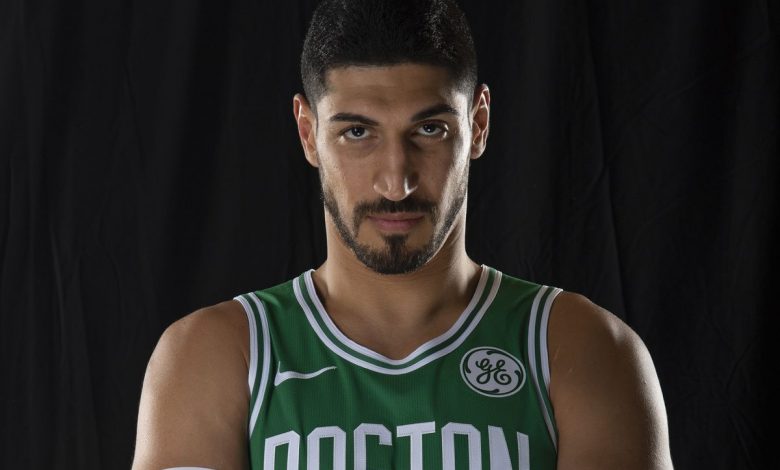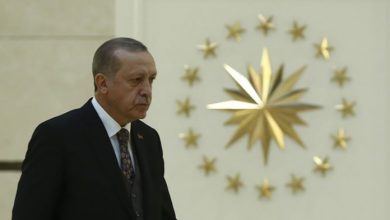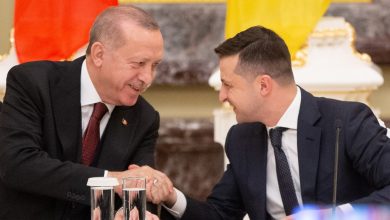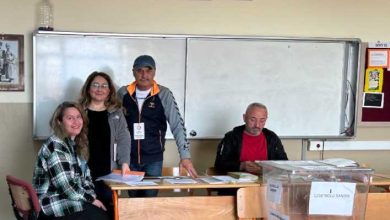Boston Celtic Enes Kanter Calls Foul on Repression in Turkey
The outspoken NBA center has been labeled a ‘terrorist’ by his native country’s government for his association with an exiled cleric

Enes Kanter, the Boston Celtics’ new center, isn’t the kind of athlete who is content to shut up and play. When LeBron James seemingly sought to placate China, chiding Houston Rockets general manager Daryl Morey for a tweet supporting protesters in Hong Kong, Mr. Kanter tweeted, “Wow dude,” accompanied by a hand-to-face emoji. For good measure, he added “SMH” (shaking my head) and a barfing emoji. Last week, Mr. Kanter took to Twitter again to lambaste Rep. Ilhan Omar (D., Minn.) for voting against a bill to place economic sanctions on Turkey for its military offensive against Kurdish forces in northern Syria.
Mr. Kanter reserves the bulk of his censure, though, for President Recep Tayyip Erdogan’s rule over his native Turkey. He has called Mr. Erdogan the “Hitler of our century.” After practice one afternoon, Mr. Kanter begins rattling off statistics of judges and prosecutors jailed, journalists imprisoned, newspapers stifled and schools closed—all part of a government crackdown following a failed coup attempt in July 2016.
“Right now, 17,000 innocent women are in jail—with babies,” Mr. Kanter says. “Turkey is putting more journalists in jail than any other country. That one makes me so pissed. There’s no freedom of speech. Over 6,000 academics have lost their jobs. One of them was my dad.”
His sustained denunciation of Mr. Erdogan has made Mr. Kanter, 27, a wanted man. He receives regular death threats. Prosecutors in Istanbul allege that Mr. Kanter belongs to the Hizmet movement of Fethullah Gulen, a cleric and former ally of Mr. Erdogan who lives in exile in the U.S. Mr. Gulen advocates a modern, moderate version of Islam and criticizes Turkey’s increasingly autocratic government; his movement has a significant following in Turkey. Mr. Erdogan and his allies say that Mr. Gulen’s acolytes are cultists plotting to take over the state and blame them for fomenting the 2016 coup. Earlier this year, Turkey issued an Interpol Red Notice for Mr. Kanter—a kind of international arrest warrant—labeling him a “terrorist.”
“The only thing I terrorize is the rim,” tweeted Mr. Kanter in response, along with a video of himself dunking. The U.S. and other countries have chosen to ignore the notice.

Mr. Kanter’s family members, who are barred from leaving Turkey, have had to distance themselves from him for their own protection. In August 2016, his father publicly disowned Mr. Kanter in a letter published in a pro-government Turkish newspaper (“I apologize to our president and the Turkish people for the shame of having such a child”). On Twitter, Mr. Kanter disowned his family in turn. “It was one of the toughest days,” he says. Still, in September 2016, his father, a professor of histology and genetics, was dismissed from his post at Istanbul University. Mr. Kanter says that his sister, a doctor, can’t find anyone willing to hire her.
Mr. Kanter’s father, who has been charged with “membership in a terror group,” now faces trial—and a five- to 10-year sentence if convicted. The family’s communications remain closely monitored. “If [the government] see any messages from me, they would all be in jail,” says Mr. Kanter. “Last time I spoke to them, I can hardly remember.”
He initially wanted to play soccer, a far more popular sport in Turkey.
Basketball is his escape and his calling. The 6’11” center, often considered one of the best offensive rebounders in the NBA, initially wanted to play soccer—a far more popular sport in Turkey. But because of his height, he was always made a goalie. “I was like, this is too boring. Just standing here catching soccer balls all day.” Mr. Kanter switched to basketball when he was 13 and discovered he “was really good at it.”
At 17, he moved to the U.S., and two years later, in 2011, he was drafted by the Utah Jazz. He went on to play for the Oklahoma City Thunder (2015-17), the New York Knicks (2017-19) and the Portland Trail Blazers (2019) before signing a two-year, $10 million contract in July with the Celtics.
Mr. Kanter is gradually introducing his new Boston teammates to Turkish cuisine. (He had reportedly gotten his former Thunder teammates hooked on kebabs.) “There’s actually a good Turkish restaurant here,” he says. “We had a cheat day there. They liked it. They’re getting used to it. I’m like, this is Turkish delight.”
Though Mr. Kanter tries to leave politics off the court, his decision to speak out against Mr. Erdogan still shadows his game. Several sports channels in Turkey, which has a growing NBA fan base, have declined to air games in which Mr. Kanter has played. When the Trail Blazers, his former team, made it to the Western Conference finals last year, many Turkish fans cheered for other teams to win so that they would be able to watch the finals.
In December, the Celtics will head to Toronto for Christmas Day games, but Mr. Kanter will have to watch from his sofa. The Turkish government revoked his passport in 2017, and he hasn’t been able to travel abroad since. A legal U.S. resident, he is seeking American citizenship and hopes that he will soon be able to travel anywhere—though not, he knows, to Turkey.
One of his few remaining links to his homeland is Mr. Gulen, who lives at a compound in Pennsylvania. “Whenever I go there, it’s a very peaceful time for me,” says Mr. Kanter. “America has given me a lot, but you still want to hang out with people who know your language, know your culture, eat Turkish food.”
The outspoken athlete and the reclusive preacher met in 2013 after Mr. Kanter began criticizing Mr. Erdogan’s rule. Mr. Kanter happened to be at the compound with Mr. Gulen when the July 2016 coup attempt took place; the Celtics player remembers watching Mr. Gulen cry and pray as they watched the news and learned of the people killed. Soon after, Mr. Erdogan started blaming Mr. Gulen for the failed coup. “I was like, are you kidding me?” says Mr. Kanter.
He still looks to the elderly cleric for guidance. “He always tells me, ‘When you see a person, see a human first. Ask one question—how can we make this world better together?’”
‘If you have a platform, I feel like you need to use it.’
Last summer, while his teammates were playing videogames and jetting off on vacation, Mr. Kanter organized 50 basketball camps in 30 states. “My friends were saying, ‘Oh my God, man, you’re going to make so much money.’ I thought, ‘You know what, I’m going to do all the camps for free.’ If you have a platform, I feel like you need to use it. If you talk about the right things, kids will follow in your footsteps.”
Mr. Kanter is excited about his new city and his new team, but as soon as he is off the court, his thoughts fly back to Turkey. “What else can I do? Am I doing enough? I’m trying to use my story to tell their story,” he says, referring to Turkish citizens suffering back home. “The more successful I get, the more awareness I can create.”
Source: wsj




